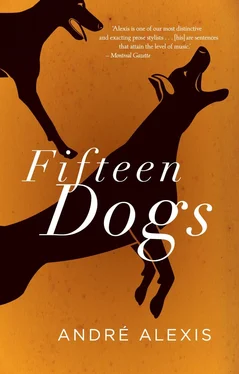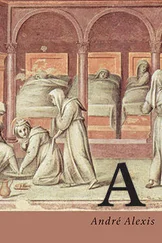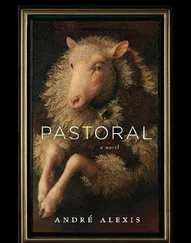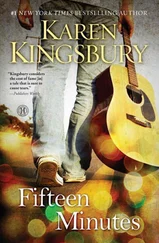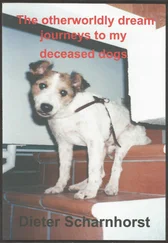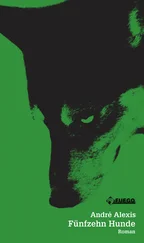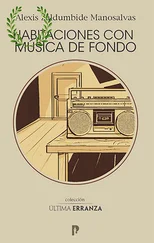Which, over the space of a week, he proceeded to do. I’ll teach him something unusual, thought Miguel, something more difficult than his name and a handful of words. He decided to teach the dog the first pages of Vanity Fair , one of Nira’s favourite novels. Thackeray’s was the kind of writing that sent English majors everywhere into paroxysms. Though Thackeray’s sentences were sometimes long and twisty –
While the present century was in its teens, and on one sunshiny morning in June, there drove up to the great iron gate of Miss Pinkerton’s academy for young ladies, on Chiswick Mall, a large family coach, with two fat horses in blazing harness, driven by a fat coachman in a three-cornered hat and wig, at the rate of four miles an hour.
— Miguel found his task remarkably straightforward.
Once Benjy understood that he was meant to repeat (in correct order) the sounds Miguel wished him to repeat, Benjy repeated them. Convinced that the beagle was little more than a good (admittedly unusual) parrot, Miguel was pleased with himself, proud of his heretofore hidden talent as an animal trainer. Every so often, he did find it strange that a beagle should, with increasing finesse, speak of three-cornered hats, fat horses and the iron gates of Miss Pinkerton’s academy. But he got used to the strangeness by imagining the look on Nira’s face the moment his dog (which is what Benjy quickly became) spoke the first page or so of Vanity Fair .
That moment never came, however.
The dynamic in the house had changed. After the ‘money’ incident, it wasn’t so much that Nira disliked Benjy as that she found the dog disingenuous. Whereas she was un intimidated by Majnoun’s silences, she began to find those moments when Benjy sat up and looked at her disconcerting. It got so she could not work when the beagle was in a room with her. So, Benjy was banished (the door closed against him), made to spend most of the day either alone or alone with Majnoun, until Miguel came home.
Miguel, for his part, began to treat Majnoun with an amused but palpable scorn. He let it be known, now and then, that he was sceptical of Nira’s claims for Majnoun’s intelligence. His scepticism was usually followed by his asking Benjy to ‘roll over’ or ‘play dead,’ as if Benjy’s execution of those tricks made his superior intelligence obvious. Of course, Nira would not humiliate Majnoun in that way. She refused to ask Majnoun, for whom she had the greatest respect, to roll around on the carpet in order to prove that he possessed an intelligence she knew very well he did possess.
Majnoun, who tolerated Benjy’s closeness to Miguel, understood the implications of Miguel’s scorn, but he could not understand the scorn itself. For one thing, he would not have guessed that ‘intelligence’ could be a source of status. It seemed to him that what humans called ‘intelligence’ (knowing the accepted names for things, performing feats that required a certain mental dexterity) was in every way inferior to the knowing he remembered from his previous life as a dog, the life before he was sideswiped by ‘thinking.’ When it became clear that Miguel gave Benjy higher status because the beagle ‘rolled over’ and ‘played dead,’ Majnoun was astounded.
No, he was more and other than astounded. Majnoun understood the implications of Miguel’s behaviour better, perhaps, than Miguel did. It was clear that Benjy was angling for status, that he wanted the position Nira had. That thought was intolerable to Majnoun, intolerable on its own but also because it brought back memories of what he’d suffered. And yet, what was he to do? He had warned Benjy. The right thing, now, was to bite the little dog to death. No doubt about it. But could he actually do such a thing? It would mean annihilating a part of himself, taking a final turn away from what had been his life: pack, canidity, coppice.
Benjy, for his part, was pleased at having mastered the skills Miguel admired, and he began to allow Miguel’s scorn for Majnoun to influence his own behaviour. For instance, when Majnoun was teaching him language, Benjy would say the word Majnoun wished him to learn, repeat it and then ask to move on to the next word. He knew, now that he was spending time with Miguel, that Majnoun did not have a proper accent, that words as Majnoun said them were not easily understood by humans. In the case of the word evening , in fact, Benjy allowed himself to correct Majnoun’s pronunciation. He corrected Majnoun respectfully but he corrected him as if he, not Majnoun, were the one who knew human language best. By the time he had memorized — without understanding it — the first page of Vanity Fair , Benjy had tentatively begun to practise the geometry of dominance: putting his head (lightly) on Majnoun’s back as they lay down together, preceding Majnoun to the food dishes and sniffing at the contents in Majnoun’s bowl before eating what was in his own, walking before Majnoun whenever he could. Benjy did not realize he was doing this. He was not conscious of it, but Majnoun was.
One afternoon, when Nira had opened the back door for them so they could get a bit of air, Majnoun attacked the smaller dog as ruthlessly as he could. They were in the middle of the yard when Majnoun bit down on the back of Benjy’s neck. He’d meant to catch the beagle’s throat in his jaws, but at the last moment Benjy had moved his head. Benjy cried out and he knew at once that he had made a mistake: Majnoun was not the dog he’d assumed he was.
There was snow on the ground. It was wet and slippery. The snow saved Benjy’s life. Majnoun slipped as he tried to pick the smaller dog up in his jaws — in order to dash the beagle against a cement step. As Majnoun slipped, Benjy wriggled free and cried out
— Nira!
but Majnoun was on him immediately.
There was a gap in the backyard fence, a gap that would (perhaps!) accommodate his body. Benjy ran for it and threw himself in. There was not quite enough space. Much of him went through, but it slowed him down enough that Majnoun managed to bite him again, drawing more blood. Majnoun could not get a proper grip, however. With every muscle in him, Benjy pulled himself through the gap and ran for his life. He did not look back. There was no need. It was clear to both of them that Majnoun wanted only to kill him.
Reason, in so far as it had any place at all, was superfluous.
Some ten minutes after she had opened the door for them, Nira returned to see if the dogs wanted back in. The snow in the yard was, in places, as if frothed up. There were patches of greenish dark earth where the dogs had struggled or stumbled. Not far from where Majnoun stood looking at her, there were also specks of blood on the snow.
— Where’s Benjy? Nira asked.
Majnoun shook his head.
— He ran away? she asked.
Majnoun nodded.
— Do you want to come in?
Without answering, Majnoun went in the back door, his wet fur brushing against Nira’s pants as he did. She would very much have liked to know that Benjy was all right, but it felt wrong to question Majnoun at that moment. That night, she told Miguel the little she knew of Benjy’s disappearance. Over the following weeks it never did feel right to ask Majnoun what had happened. And, in the end, they never spoke of the dog again.
Olympus, the city, lies atop Olympus, the mountain. Much more than that cannot be said because it is, as any city is, a correlative of the minds that made it. Travel through Olympus would be a revelation of the imagination that conceived the city. That imagination being divine, no human language can express it. In English — if one must speak English — Olympus is best encompassed by the words nothing and nowhere , though it is something and somewhere, and he whose mind Olympus best mirrors, Zeus, father of the gods, was unhappy with his sons.
Читать дальше
